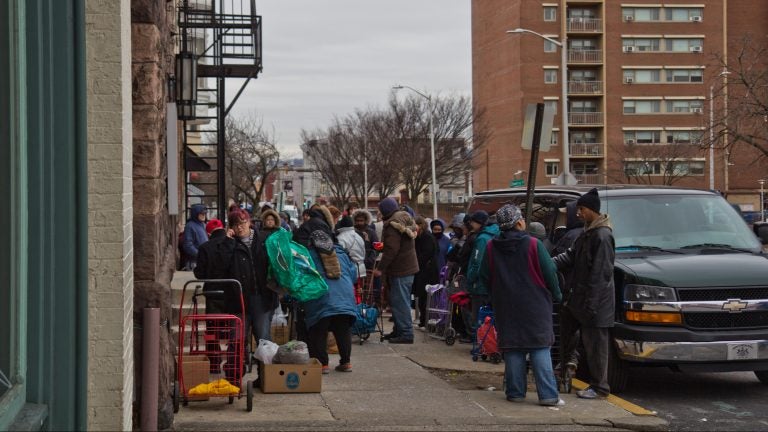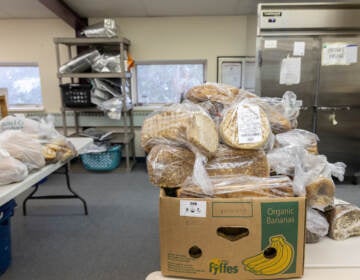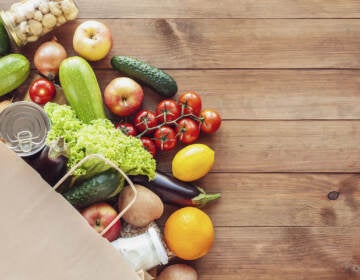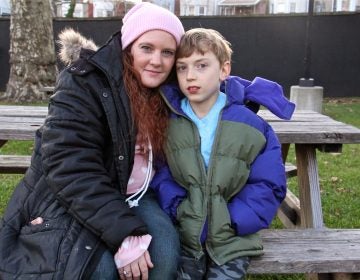Government shutdown is over, but neediest Pennsylvanians on SNAP still scrambling due to payment disruptions
Nearly 2 million Pennsylvanians on food stamps have to wait until March before the next round of SNAP benefits.
Listen 3:56
Residents of Reading, Pennsylvania wait in line at the St. James Chapel Church food bank. Four in ten households in Reading receive SNAP benefits. (Kimberly Paynter/WHYY)
Daniel Davenport, 45, cobbles together a living by working part-time in music production and relying on food stamps.
In January, the $182 he counts on every month was loaded twice on his government-issued Supplemental Nutrition Assistance Program debit card.
“I thought, ‘oh wow, that’s like a bonus,” Davenport, who lives in Montgomery County said. “Although it’s not.”
It’s not, he found out, after watching a local television report on the federal government paying out February’s food stamps early. At the time, there was no clear end in sight to the government shutdown, which pushed officials to devise the workaround.
“Which was really important,” said Dottie Rosenbaum, who studies food stamps at the Center on Budget and Policy Priorities. “Because in the event that the shutdown continued, it protected SNAP and it ensured that individuals would receive SNAP benefits for the month of February, which otherwise would not have been assured.”
But here’s the rub: Government reopened a week after the double payment. And now, nearly 2 million Pennsylvanians on food stamps have to wait until March before the next round of benefits.
It is the latest sign that the full effect of the month-long partial government shutdown is still rippling across the country and throughout Pennsylvania.
The U.S. Department of Agriculture runs SNAP, but states are in charge of distributing benefits. The majority of those who receive SNAP are children, the elderly, or people who struggle with a disability. Government statistics show the average benefit for individuals is $125 a month.
For Davenport, his next SNAP disbursement is more than five weeks away. He already used most of February’s payment stocking his pantry.
“Cereals, oatmeals, soups, because it’s winter. Like, canned spaghetti, canned ravioli, canned lasagna, stuff that I can freeze,” he said.
The disruption to benefits has Secretary Teresa Miller of Pennsylvania’s Department of Human Services on edge.
“Right now, frankly, all of our energy is trying to figure out what we can do to help people get through to their next March payment,” she said.
Miller is urging Pennsylvania residents to donate this month to their local food banks since they’re expecting a surge in demand. Miller says she has been chipping in herself.
“I wrote a check that was a little higher than what I normally write because I’m concerned about people this month,” she said.
She said Pennsylvania attempted to inform SNAP recipients about how to budget for February’s double payment, but she acknowledges letters did not reach recipients until after the change. She blames the logistical nightmare on the federal government.
About 90 percent of those on SNAP nationwide will go more than 40 days between food payments, according to Rosenbaum.
“So that will put a strain at the end of February and the beginning of March for many households across the country,” she said.
At a food pantry in Lansdale, Christi Schatz lined up for donated food this week. She usually uses a mix of SNAP and disability benefits to buy groceries. But she has depleted both. She was counting on getting a payment this month.
She thought, like many others, that the double payment was a glitch.
“Right now, because I don’t have my food stamps, I had to either come up to the pantry to get food or my mom helped me with getting groceries,” said Schatz, 40, who does not work due to a medical condition.
In Harrisburg, meanwhile, Pa. DHS Secretary Miller has this message for politicians in Washington:
“I hope they’re hearing from people that have been impacted and are still being impacted and can come to a solution that doesn’t further hurt people that are caught in the middle,” said Miller.
Thinking about February 15th fills Miller with dread. As Democratic leaders and President Trump remain at odds over funding a border wall, that’s the day the short-term budget deal that temporarily reopened the government is set to expire.
Federal officials have told states they can release March benefits early. But in Pennsylvania, Miller worries that would only trigger the same problem all over again.
“It’s incredibly frustrating,” Miller said. “If another shutdown occurs, this situation is only going to get worse for the people caught in the middle.”
WHYY is your source for fact-based, in-depth journalism and information. As a nonprofit organization, we rely on financial support from readers like you. Please give today.





